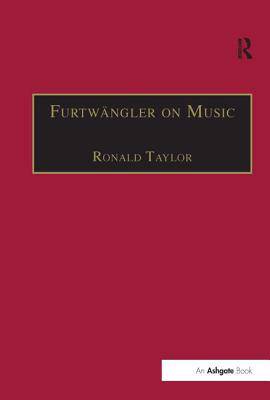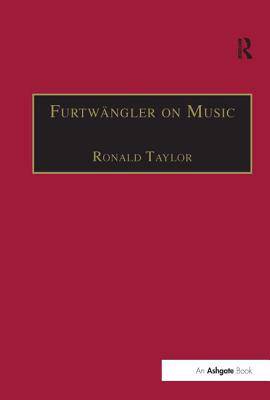
- Afhalen na 1 uur in een winkel met voorraad
- Gratis thuislevering in België vanaf € 30
- Ruim aanbod met 7 miljoen producten
- Afhalen na 1 uur in een winkel met voorraad
- Gratis thuislevering in België vanaf € 30
- Ruim aanbod met 7 miljoen producten
Zoeken
€ 290,45
+ 580 punten
Uitvoering
Omschrijving
Wilhelm Furtwängler left not only some of the greatest interpretations of operatic and symphonic music on record, but also expressed his views on musical issues of the moment in a number of outspoken essays and talks. His writings range from practical matters of performance and interpretation to aesthetic reflections on what he saw as the alarming direction in which music was developing in the wake of Schoenberg and the twelve-tone system of composition. Professor Ronald Taylor has here, for the first time, translated and annotated a selection of Furtwängler's writings covering the four decades from the First World War to the conductor's death in 1954, and prefaced them with an essay on Furtwängler's controversial career and complicated personality. The result is a collection of stimulating pieces with a claim on our attention, made all the greater for reflecting the musical and philosophical ideals of one of the great conductors of the twentieth century.
Specificaties
Betrokkenen
- Auteur(s):
- Uitgeverij:
Inhoud
- Aantal bladzijden:
- 200
- Taal:
- Engels
Eigenschappen
- Productcode (EAN):
- 9780859678162
- Verschijningsdatum:
- 12/12/1991
- Uitvoering:
- Hardcover
- Formaat:
- Genaaid
- Afmetingen:
- 156 mm x 234 mm
- Gewicht:
- 458 g

Alleen bij Standaard Boekhandel
+ 580 punten op je klantenkaart van Standaard Boekhandel
Beoordelingen
We publiceren alleen reviews die voldoen aan de voorwaarden voor reviews. Bekijk onze voorwaarden voor reviews.








